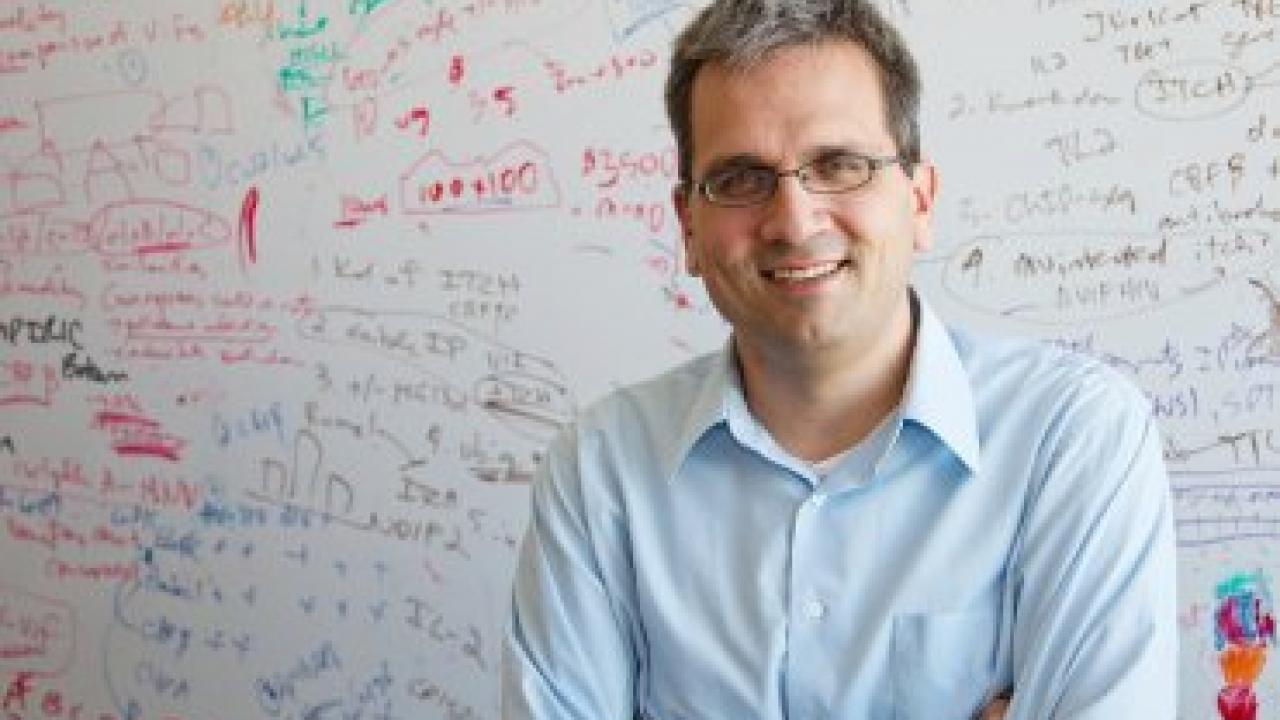
Nevan Krogan, PhD, is the founding director of UCSF's new Quantitative Biosciences Institute. Photo by Susan Merrell
UC San Francisco today announced the establishment of the Quantitative Biosciences Institute (QBI). The mission of QBI, located on the UCSF Mission Bay health sciences campus, is to drive forward the application of computation, mathematics, and statistics toward a deeper understanding of complex problems in biology, with the ultimate goal of developing new treatments for disease.
The founding director of QBI is Nevan Krogan, PhD, who in this role reports to B. Joseph Guglielmo, PharmD, dean of the UCSF School of Pharmacy. Krogan, a UCSF professor of cellular and molecular pharmacology and a senior investigator at the Gladstone Institutes, is known for his research into developing and using systems biology approaches to help understand complex biological phenomena at a mechanistic level.
“Our goal at QBI is to help make precision medicine a reality by using quantitative research tools to understand the underlying biology behind different disease states, and then to use that knowledge to develop novel diagnostics and therapies and put them into the hands of clinicians,” said Krogan.
The institute initially will focus on such conditions as breast cancer, head and neck cancer, psychiatric disorders, including autism, bipolar disorder and schizophrenia, as well as the relationships between infectious diseases and their hosts.
Collaboration for the Work at the Institute
QBI scientists will work in collaboration with researchers from across the University of California and beyond.
At QBI, [Nevan Krogan] will be in an even better position to facilitate productive new cross-disciplinary collaborations between researchers, clinicians and industry.
Krogan also directs the UCSF site of the California Institute for Quantitative Biosciences (QB3), a state institute spanning three UC campuses – San Francisco, Santa Cruz and Berkeley – with a mission of supporting scientists at the intersection between the biological and quantitative sciences, and supporting entrepreneurial efforts stemming from that science to grow the California economy. QBI will be located in Byers Hall, which is the QB3 headquarters at UCSF. In his role leading QB3-UCSF, Krogan reports to UCSF neuroscientist Regis Kelly, PhD, former executive vice chancellor at UCSF and chair of the Department of Biochemistry and Biophysics, who leads QB3.
“As director of QB3-UCSF, Nevan is already helping to revolutionize biological research at UCSF,” said UCSF Chancellor Sam Hawgood, MBBS. “At QBI, he will be in an even better positioned to facilitate productive new cross-disciplinary collaborations between researchers, clinicians and industry.”
“We now have an immense amount of gene sequencing information for a number of different diseases,” said Krogan. “But there is now a realization that there is only so much we can do with purely genomic information. UCSF faculty affiliates of QBI are in a perfect position to take the next step, which is to extract insight from the genomic data by developing and using computational and experimental tools to study how genes and proteins function together. We also aim to gain a deeper biochemical and biophysical understanding of how the machines of the cell – the protein complexes – are perturbed in different disease states, as well as exploit novel approaches for intervention using chemical biology tools.”
To tackle breast cancer and head and neck cancer, Krogan is co-directing the Cancer Cell Map Initiative (CCMI) with Trey Ideker, PhD, chief of medical genetics in the UC San Diego Department of Medicine. Krogan described the CCMI as a “cross-UC program focused on using quantitative systems tools to help understand the underlying biology behind the genomic data derived from breast, head and neck, and other cancers.” Alan Ashworth, PhD, FRS, director of UCSF Helen Diller Family Comprehensive Cancer Center; Jennifer Grandis, MD, associate vice chancellor of Clinical and Translational Research (AVC-CTR); and Scott M. Lippman, MD, director of the UC San Diego Moores Cancer Center, are also key participants of the CCMI and will provide access to tissue samples donated by cancer patients.
QBI is collaborating with Jeff Cox, PhD, faculty director of the Henry Wheeler Center for Emerging and Neglected Diseases at UC Berkeley, on the Host-Pathogen Mapping Initiative (HPMI). The aim of HPMI, said Krogan, is to bring UCSF and UC Berkeley investigators together in an effort to use quantitative approaches to study the host-pathogen interface, focusing on both bacteria and viruses.